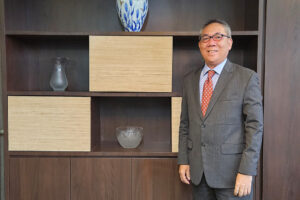
Marubeni PHL shifts focus to RE as coal contracts near end
By Aubrey Rose A. Inosante
AS the 25-year contracts for the coal-fired power plants of Japanese firm Marubeni Philippines near their end, Shigeru Shimoda, the company’s president and chief executive officer, leads a transition towards renewable energy (RE).
The objective is to reduce coal reliance by 2025, aligning Marubeni with global sustainability goals, he said in an interview with BusinessWorld.
“Currently, our power generation is in Pagbilao (Quezon) and Sual (Pangasinan), both of which are large coal-fired power plants, but the build-operate-transfer (BOT) contracts (will expire soon),” he said.
The BOT contracts for the Sual and Pagbilao plants will expire in 2024 and 2025, respectively.
A BOT contract refers to a financing model commonly used for large-scale projects, typically infrastructure projects developed through public-private partnerships.
TeaM Energy Corp., a joint venture between Japanese companies Marubeni Corp. and JERA, functions as an independent power producer that owns and operates the 1,218-megawatt (MW) Sual Power Station in Pangasinan and the 735-MW Pagbilao Power Station in Quezon. In collaboration with Aboitiz Power Corp., it also operates the 420-MW coal-fired Pagbilao Unit 3.
“We need alternatives. It’s not straightforward, but we are exploring floating solar and offshore wind projects alongside other players,” he said, adding that San Miguel Corp. and Aboitiz Power Corp. will take over Sual and Pagbilao.
Mr. Shimoda said that the company is keen on maximizing the San Roque Multi-Purpose Dam and Hydroelectric Plant in Pangasinan but is still in discussions with the Department of Environment and Natural Resources.
Marubeni, which began operations in the Philippines in 1909, is also exploring opportunities in solar farms, but it is hindered by foreign restrictions in terms of land ownership.
Nevertheless, the company is determined to identify a suitable location and establish partnerships with reliable local entities, Mr. Shimoda said.
“Mr. President says solar is fine, however, we always have to take into account the land competition among the farmers as you try to develop. Let’s say developing gigawatts of solar, it could take thousands of hectares,” he said.
“Looking at the whole Marubeni, the power division developed a huge size of the solar power generation in the Middle East. Marubeni, as one of the leading Japanese companies, we have to do [these] to tackle global warming,” he said.
Mr. Shimoda also noted Marubeni’s interest in the operation and maintenance of the North-South Commuter Railway, which spans 147 kilometers and is currently being developed as a commuter rail system in Luzon.
Besides renewable energy initiatives, he highlighted the company’s healthcare involvement through a joint venture with LSI Medience Corp. and Metro Pacific Hospitals.
“Last year, we invested in In Vitro Fertility (IVF) services in Quezon City,” he said, noting that Marubeni and Towako Repro Bio Cell, Inc. operate through a joint venture company Conceive IVF Manila, Inc.
PATH TO LEADING MARUBENI PHL
Mr. Shimoda began his journey with Marubeni in 1988, opting for a different path from his father who held a position at Mitsubishi Corp.
He initially ventured into wood chip plantation development and progressed to the role of president director at P.T. Musi Hutan Persada, overseeing a tree plantation in Indonesia.
Reflecting on his assignment as president and CEO of Marubeni Philippines, he acknowledged his prior experience with Southeast Asian countries despite never having visited the Philippines before.
As the pandemic disrupted normal business operations, Mr. Shimoda assumed his role in the Philippines in April 2020, navigating virtual interactions from his condo.
Recognizing the challenge of establishing his presence remotely, he said he endeavored to introduce himself through digital platforms to Filipino business counterparts already familiar with Marubeni.
He said his integration into the local business community began gradually through invitations from Mr. Edgardo Puyat Reyes, whom he met at the Manila Golf Club.
Mr. Reyes, who recently passed away, repeatedly invited Mr. Shimoda for golf sessions, providing opportunities to engage with other club members and gain insights into Filipino customs, history, and business practices.
“We talked, and he introduced me to other members. I learned a lot about the customs, history, and business background of the Philippines from Mr. Ed Reyes. I appreciate what he did for me,” he said.
Mr. Shimoda, alongside his role at Marubeni, serves as vice-president of The Japanese Chamber of Commerce and Industry of the Philippines Inc. (JCCIPI), having previously held the position of president until last March.
He views his involvement in JCCIPI as crucial for enhancing Philippine-Japan economic relations and representing around 680 members.
In discussing the competitive landscape, Mr. Shimoda underscored the Philippines’ need to attract foreign investment more aggressively, highlighting the country’s advantages such as its youthful workforce and growing mid-income population.
He stressed the importance of creating jobs and enhancing incentives to compete effectively with countries like Vietnam, Indonesia, Malaysia, and Thailand, which have robust manufacturing ecosystems and established supply chains.
“That’s what I keep telling to the government. I think in this country, the only thing to concentrate on is to create a job, then we need foreign investors as more labor force will be available due to young workforce,” he said.



